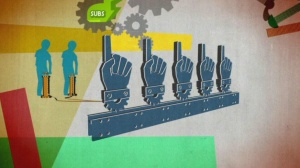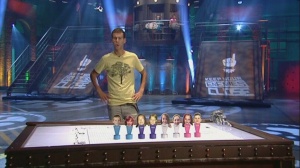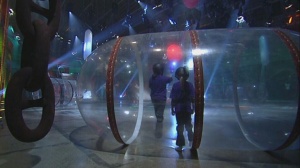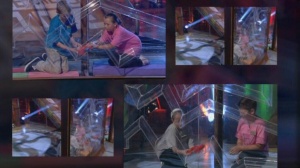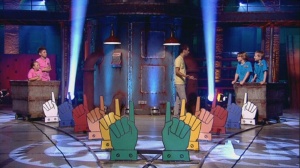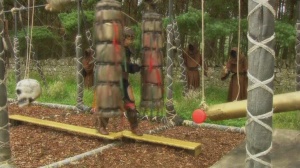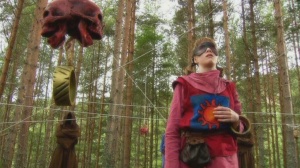Weaver's Week 2009-11-22
Last week | Weaver's Week Index | Next week
It's not just The Sarah Jane Adventures... there's far more to children's programmes than the sci-fi drama and its spin-off shows. This week's Week reviews the two programmes that went out before episodes of the recent series.
Contents |
Keep Your Enemies Close
CBBC for BBC1, 4.05 Wednesday and Friday, 9 October – 20 November
| Readers with attentive memories will recall part two of our Review of the Decade, where we discussed teamwork, and individual work, and the space where the two meet. Another excellent example of this genre has been going out in CBBC's Game Show Zone.
Keep Your Enemies Close is a fairly simple game. Four pairs of best friends turn up to compete. In the opening round, they'll work together as a team, hoping to win an advantage later in the show. The players are then split up and recombined into four new pairs. These new pairs take another challenge, with the worst pair out of the game for now. Split up the new pairs, recombine into newer ones, eliminate the worst. Four remain, form them into even newer pairs, find the better pair again. These two winners then release their friends into the game, and the original friends work together in the grand finale. Shows like this stand and fall on two elements: the challenges, and the presentation elements. In both parts, Keep Your Enemies Close is a curate's egg, with some excellent elements and some humdrum ones. We'll begin with the presentation: the inter-round graphics really work well. The artwork owes a debt to the Dadaist school of cutting up images and re-assembling the pieces, and to the geometric feel of Franz Ferdinand's video clip for "Take me Out" (2003). The show's music is pacy and unsettling (we were going to put menacing, but that's too strong), and these sounds also work well. | |
| We're not entirely convinced by the set design; the challenges call for a large open space, and the set is built around a large open space. At one end are two giant ramps, leading up to a walkway, on top of which is a giant revolving drum. This is known as The Mixer, and it's the device by which the producers announce the new teams to the contestants. Off in one corner is a table, containing representations of the players – oversized heads on puny bodies are another Dadaist motif. These chips are used to illustrate which contestants are playing together, and an excuse to rattle off some anecdotes that might explain how the pairs will work together. Or, more likely, some anecdotes that might pad out the programme to the required length.
Joel Defries hosts the show, he's the slightly madcap one off of Blue Peter. No, present-day Blue Peter, you're thinking of Mark Curry. Actually, Joel is a bit like Mark, underneath the cheeky young brother facade and the air of klutziness there's a razor-sharp talent, able to explain complex and difficult ideas in a concise and engaging manner. Joel has his work cut out with this script, especially when explaining in great detail just how the show works. We've managed to explain the whole show in one paragraph, but then we're not writing for six year old children who will need to see the explanation, and will need to see the explanation every time. No, that's unfair to children, they'll get the idea after one viewing. It's their parents who will need the laborious explanation of how the game works every single show. | |
| And so we come to the challenges. Before The Mixer, before the concept of "frenemies" (friends-and-enemies at the same time, do you see?), there's an opening challenge, the same every time. Tube Strike has the pairs of friends cooped up in giant plastic lozenges, running across the studio floor. The task is two-fold: first upend the lozenge so that it strikes a ball in the opposite corner, then return to the middle and burst a balloon. The first pair to burst the balloon wins the Hand of Friendship, which they can use in the final – if they get there.
The Mixer then does its work, and spits out four new pairs of frenemies. The bulk of the show is taken up by playing three challenges from a fairly small bank of about ten games. Some of them are actually rather entertaining: one has a hairdryer for each player and a number of lightweight red balls, with the object being to keep the balls out of your own gutter and land them in someone else's. Another good game has the teams completing a six-piece jigsaw from underneath the table, and while lying on tea-trays with wheels. The final challenge is something both teams do between themselves, allowing split-screen shots – close-ups of both teams and a more general view. Shades of The Mole there, and that's always good. It's a slight shame that there are so few games, but the ones they do have are good enough to bear repetition. After each challenge, the losing pair have a quick chat with Joel (along the lines of "Where did it go wrong?" "They were better than us.") and are then sent back to lockdown in The Mixer, from where they won't return until the end of the show, if at all. | |
| The grand final sees the winning pair split up, and their original team-mates released from lockdown. They're put in open coal wagons, on railway tracks with hands blocking their path. (And, let's be honest, very noticeable remote-control cables). In the final, each pair is given a letter of the alphabet and a category, and five seconds to come up with two answers from that category beginning with that letter. Fail, and they move down the track, knocking down the next hand. Succeed, and the opponents will progress. If they've got this far, the winners of Tube Strike can use their "Hand of Friendship" token as an automatic correct answer.
During this grand final, it's clear that the show has begun to run out of creative zest. If the opening challenge would go down in The Crystal Maze as a physical test, and the ones between tend to a skill game, a mental game, and one that defies categorisation, this final is the bit where we realise the team's only got three crystals in their last zone and can't possibly win. It's wordy and drags on and on and really rather sucks the life out of the show. Could we have had another more physical game, perhaps something out of the Friends Like These stock? We've said in the past that gunge is the last resort of a children's television show, something to throw at the contestants when there's nothing left in the creative bag. On Keep Your Enemies Close, getting gunged is the consolation prize for the losers in the final. Once they pass the "Clag Barrier" – the last pair of hands – their opponents can send the railway car down the line, and under some tubes containing various coloured gloop. The winners receive hand of friendship medallions, solid silver hands on a chain – one has the left hand, one the right. This game isn't about the prizes, but the taking part. Get 100 it's not. | |
| We found the game to be agreeable entertainment, but not outstanding. Taken as a whole, it's somewhat less than the sum of its parts. If the producers cut the gabbing and concentrated on the gaming, the show could easily run for 20 minutes, rather than the half-hour slot demanded by the schedule.
If we cut beneath the filler, and the slightly anti-climactic final, we find something surprising. Keep Your Enemies Close is a perfectly-formed summary of the individual-and-team dichotomy we discussed a month ago. The only way a player is going to win on this show is by working well with their enemies; hanging back and trying to stop your enemy from winning will only result in your own downfall, and your ally in this round is certain to be your enemy in the next. We're having difficulty recalling a show where such constantly-shifting allegiances and pragmatic pairings were an integral part of the format. And it's all made so effortless, which has to be a tribute to something. We're not sure whether it's the quality of the production, or the way these values have been internalised by society. Or if the show is an unconscious tribute to the Dadaist school of deconstructive art, constantly challenging the audience's expectations. Whatever, it's a great lesson in philosophy, a slight shame about the execution. |
Raven
BBC Scotland for BBC1, 4.05pm Tuesday and Thursday, 15 September – 19 November
| We said last year that we were beginning to run out of things to say about Raven. This year, we pretty much have run out of things to say about Raven. Still, no other television critic bothers to review this show, and that's entirely unfair for CBBC's second-longest commission of the decade, behind only Blue Peter. Nine regular series, three specials, including one in India.
As has been standard since the Fourth Tournament, each warrior begins with nine lives, and nine rings buys back one life. Like the last run, the shows were filmed in and around Aviemore, using the latest high-definition equipment. As happened last year, Raven's presence on BBC-HD necessitated a 28-minute running time, which in turn required some extended chats with the contestants to fill time. Sadly, the effect of lives disappearing from a real standard still doesn't work in HD, so scores are shown on a computer-generated image. After seventeen new challenges last season, this year proved somewhat more stable. The new games included Forest of Fear, where the contestants stood on tree-tops, holding a rope. Where the ropes met, there's a hook, and that allows them to hook the rings helpfully elevated from the ground. Viewers of a certain vintage might remember a very similar game played on Jungle Run, with the demons replaced by a burning can of petrol. Pontoon Pursuit was also new, with two contenders chasing after each other on a square floating on the lake. First person to fall in lost, or the person who caught up with the other won. The Bridge was controlled abseiling from the top of an arched bridge down and across to the sides, grabbing gold as they went. | |
| New mental games were Roman Road, a fiendishly difficult mathematics puzzle involving Roman numerals. A prior version of this challenge had been in the spring's Raven: The Dragons' Eye series, but that was far more simple. Conundrum didn't ask the contestants to unscramble a nine-letter word, but to complete a jigsaw and call out the shapes they saw to open some boxes. This was perhaps too complex to work on television.
Other challenges looked new, but were actually old. Treetop Treasure had the contestants scurrying up a tree, grabbing rings as they go, first to the top won. It's been played in various disguises before. Pendulum had one warrior fishing rings out of a river while standing on a small platform, their movement controlled by colleagues on opposite banks pulling on ropes. Scramble was perhaps the most simple game ever: run down a hill, grab a ring, race back to the top. Even a parent could understand that. We were rather pleased to see Tree Rock and Sunken Treasure return, two of the most Boyard-esque games introduced last year. We also liked the way that the finalists were challenged to progress through the Thrall Forest while seeing where they were going, the blindfolded challenge was far too difficult this year. Once again, the skill and courage of the contestants has seriously impressed us, as has their ability to do things the we never could. Crossing Ring Reach? Not for us, not likely. There's nothing new to say about Raven, it is what it is, and it does what it does, and it does it very well indeed. |
University Challenge
Second round, match 3: St John's Oxford v Loughborough
Here's a completely useless fact: top team in the third match of the second round last year was St John's Cambridge. Their Oxford namesakes got here by beating a promising Durham side on 14 September, Loughborough defeated the repechage finalists UCL on 20 July. We'll see UCL next week, and not before we've had Elementalist of the Week: it's Euclid, and we can already see the quality buzzerwork that gave St John's the highest score of the first round. We never knew that Christie's and Sotheby's once played rock-paper-scissors to win an auction commission. We're impressed that George Woudhuysen had the presence of mind to stop and work out a question about how Costa Rica got its name.
Loughborough got off the mark with the fifth starter, itself a Freudian slip. The first visual round is on an impressive bridge, all triangles and such, but no-one recognises the handiwork of Norman Foster, St John's lead is 60-15. Greek letter of the week is lambda, simile of the week is on the layers of an onion. St John's are visibly kicking themselves after confusing Earnest with Bunberry in the Oscar Wilde play, and Thumper is impressed when Anne Jennings of Loughborough knows her Dewey decimal numbers. A student who knows about the workings of a library? Must be a mature student.
Everyone from St John's has a starter correct, and we've not yet reached the audio round. The team are played "Sugar sugar", but who recorded it? Not the Temptations, not the Swinging Blue Jeans, but the Archies. St John's lead by 115-65, a lead diminished by other number one singles from 1969. Surely none of the team was around at that early date! The play Equus gives Loughborough another starter, and it looks as though St John's aren't going to have it all their own way.
But only for a moment: one more starter and a full set of bonuses restores their 50-point cushion, and their bonus conversion rate is flying over 2/3; Loughborough's is barely at a third. No-one can recognise the constellation Leo when they see a picture of it, and St John's lead has been trimmed to 140-110. Geekery of the Weekery would have been on "avatar", except that it went on the description of an Indian deity.
Know your Eurovision: name a country from its borders and we'll not sing any of their songs to you. Especially good news when the country is Czechia, where the median national score is 1 point. Loughborough do somewhat better, pulling back within 20 points. But again, St John's get the starter, and the full set of bonuses, and pull away. Thumper is harsh but fair to disallow a late answer from Loughborough, Oxford picks up the points, and it's almost game over.
What's the difference between gastronomy and astronomy? The letter G, obviously. We never knew there was an encyclopaedia of fonts, and we suspect that David Townsend's suggestion that the gall bladder is commonly found in a marsupial's pouch was a guess. Even the guesses count, and that just about wraps up the match. Loughborough do get to answer a starter each, but that's as far as they'll get: St John's has won by 220-190.
Loughborough were good. Loughborough were really good. That 190 would have won both of the previous matches, and it's unfortunate that they'll not be taking any further part in the contest. Anne Jennings got eight starters in the losing cause, the side increased its bonus rate to 16/32. St John's were led by David Townsend's five starters, but the side was right on 24/33 bonuses, a remarkable rate, and making up for two missignals. The overall accuracy rate was a very creditable 62/93.
Next match: University College London v Emmanuel Cambridge
Mastermind
Heat 12
Many congratulations to Het Grauniad, who published a piece about one of the contenders on last week's edition of Mastermind. "Black chair brings ignominy for Mastermind contestant" was published at 14.28 on Thursday, a mere 138 hours after the show went out.
Here's the throw-in: Keith Pottage begins tonight's show with the History of the NFL 1920-1974. The National Football League is a winter competition between the various teams, and by virtue of its winter date has traditionally been seen as less important than the All-Ireland football championship. The winners were usually Kerry or Mayo... hang on, they seem to be discussing a different topic. What? There's another NFL out there? How very confusing! The contender ends on 14 (0).
Ritchie Venner has the first Tudor monarch. Henry VII (1457-1509) won the War of the Roses, leading his Lancaster team to victory over Yorkshire following a disputed handpass by his brother Terry in extra time. Henry married Elizabeth of York, thus ensuring the two sides merged. He secured the English throne by promoting international trade and making sure his tax collectors actually collected taxes. Another strong score, the contender finishes on 14 (2).
Bernadette Turner discusses Stephenie Meyer's "Twilight" novels. Meyer (b 1973) is the author of four books about love, romance, danger, female submission, and shockingly bad writing. Apparently, there's some form of movie from this series doing the rounds at the moment, though we must confess it's entirely passed us by. No questions about quidditch, and the round ends on 12 (1).
Our final contestant this year is Euan McCulloch, and he's been looking at the architecture of Aberdeen since 1800. Aberdeen is a city in north-east Scotland, built at the mouths of the Dee and Don rivers. It's known as the Granite City, after the predominant local stone used in the last couple of centuries. The contender knows his subject, ending on a perfect 16 (0).
Very high scores this week, 25 points will give the runner-up a place on the repechage board, 27 will put them in second and an almost-certain return in 2010. Bernadette Turner is first into the general knowledge round, and she remembers that Lulu was backed by the Luvvers, and that Andrew Lloyd Webber composed this year's UK entry to the Eurovision Song Contest. That's the senior contest, Britain won't be in the Junior version. A run of passes in the middle of the round does the contender no favours, and she finishes on 21 (7).
Keith Pottage proves very early that guesses count, getting "croon" from its definition and that ozone is mostly in the stratosphere. One of our colleagues at UKGS Towers wonders if this contender is the same person who made THE KRYPTON FACTOR's final in 1985. He continues to make credible attempts at the questions, but meets with slightly less success, and a late flourish is perhaps a little too late, ending on 25 (2).
The repechage:
- John Cooper 29 (3)
- Ian Scott Massie 26 (2)
- Les Morrell 26 (3)
- Colin Wilson 25 (0)
- William de Ath 25 (4)
- Frances Gregory 24 (2)
Ritchie Venner bangs out the answers he knows – Aerosmith, French, Washington – and swiftly passes when he knows he doesn't know. The real hidden transmission indicator of the week comes in this round, a question about the BBC's annual Children in Need of Assistance appeal, currently airing on BBC1. He keeps taking the questions, but just fails to get the answers he needs, ending on 24 (4).
Euan McCulloch needs ten to win, and remembers when Cherie Blair bought flats in Bristol, though not the most famous angels of Islam. No-one on this show knows anything about angels! The contender is within hailing distance of the winning post, but like his predecessor can't quite move over the line, ending on 24 (6).
So Keith Pottage has won the night, and Mr. Venner doesn't quite make the repechage board, missing by two passes.
And with the heats half-completed, that ends regular Mastermind for 2009. In this slot next week, the black chair will be replaced by Gardeners' World, a show tilling the soil in the middle of winter, at night. Still, at least it gives Het Graun six weeks to catch up on this week's edition.
This Week And Next
We're not going to get to review the new series of Bamzooki this year, but we must mention one thing from the opening episode: those computer graphics are brilliant! It really look like the zooks are in the room with the players, and we cannot see the join between the street and the creatures.
The British Comedy Awards have published their nominees. It's good news for Charlie Brooker, his Dead Set is up for Television Comedy Drama, and the man himself for Male Newcomer on the basis of You Have Been Watching. The Comedy Panel Show award pits Have I Got News for You, Mock the Week, and QI against each other. The awards will be dished out on 12 December.
We regret to report the death of Ken Ober, the host of Remote Control on MTV. It was the first show game show to parody the art form, and was the first to ask youth to compete rather than a housewife from Iowa. The British version was hosted by Anthony Wilson, who died in 2007; MTV last played some music in 2004.
In the ratings to 8 November, it's Cowell 15, Strictly 9.5, Family Fortunes 6.9, HIGNFY 5. Yep, fifteen million people tuned in to Simon Cowell Doesn't Send JOHN AND EDWARD Home. Elsewhere, Dancing on Two edged towards 3m, Mastermind passed 2.5m, and Eggheads reached that figure, eclipsing its score from the snow day at the start of February.
More Annoyance had 2.52m viewers. It's not quite the highest audience ever recorded on a digital-only channel – but the record is within sight. While it lasts, the peak is 2.86m for Friends in 2000 and a footy match in 2004. Come Dine With Me had 1.075m, the midnight Simon Cowell repeat 650,000, and America's Next Top Model 445,000.
New shows for the new week include Argumental on BBC2 (11.30 tonight), Chinese whispers show Copycats (CBBC, 4pm weekdays), modern art on School of Saatchi (BBC2, 9pm Monday), and the G series of QI (BBC1, 9.30 Thursday). Regionalia fans will be looking for The All-Ireland Talent Show (RTE1, 6.30 Sunday) and The Chef's Apprentice (STV, 8pm Monday). Next Saturday's times: Strictly 6.50 – 8.25 (ballroom or Latin), Simon Cowell 8pm – 9.45 (songs of the Teletubbies), immediately followed by I'm a Celeb.
To have Weaver's Week emailed to you on publication day, receive our exclusive TV roundup of the game shows in the week ahead, and chat to other ukgameshows.com readers, sign up to our Yahoo! Group.

